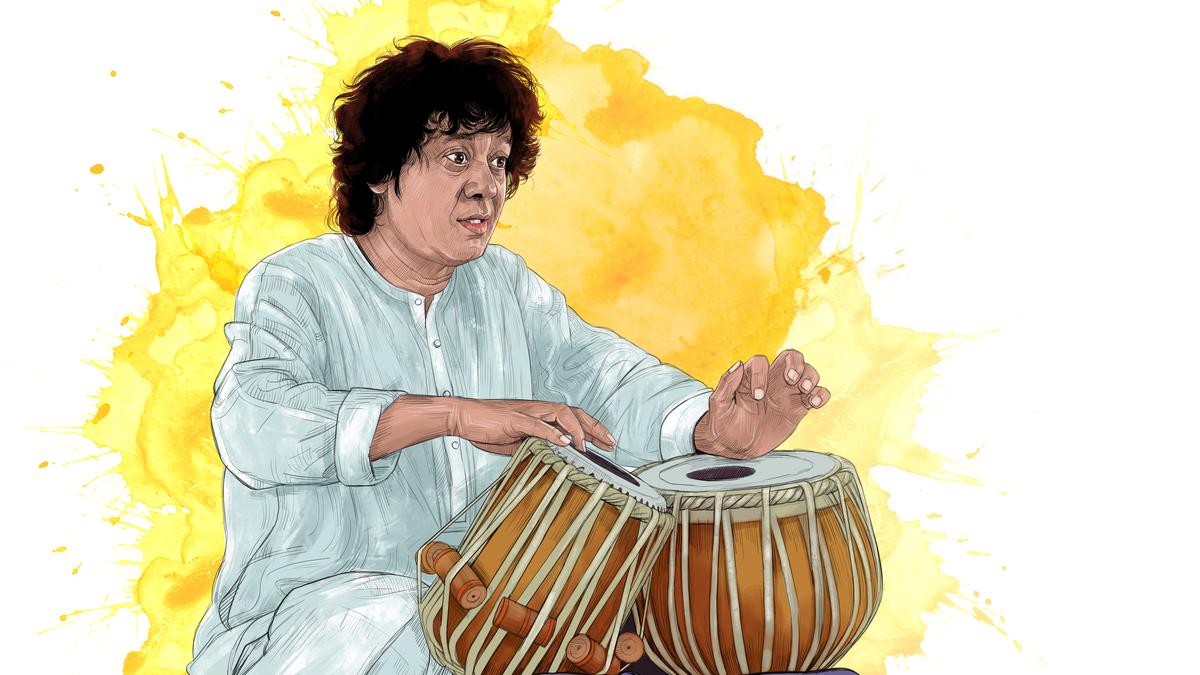Zakir Hussain will continue to be the sound of India for a long time to come.
| Photo Credit: Illustration: R. Rajesh
Have you seen fireflies in the wild? On those nights when the beat of a thousand lives pulsating forms its own soundscape, and the glow of these wondrous creatures creates a visual miracle — a phenomenon.
If you ever met or moved in the presence of Zakir Hussain, this is perhaps the image in the mind’s eye — a sort of wondrous spectacle of someone beyond the ordinary. Imagine the residual glow of millions of flashbulbs dissipating into pinpricks of light — particles dancing, colliding and finally settling into one human form. This would just about begin to describe the effect Zakir had by just entering a room. I like to think that in her own way, Nature conferred some amount of bioluminescence on a chosen few. Zakir probably led that pack.
Sometime during the autumn of 2006, I attended a solo piano recital at Carnegie Hall in New York. The performer was not particularly famous, but the programme consisted of Bach’s The Art of Fugue, and as a student, this sounded too good to miss. The performance was not memorable, and there were passages that the soloist struggled through. I remember that a few attendees even left during pauses.
In those lovely days before smartphones, we did not have a choice but to seek distraction by gazing at other attendees or the upholstery. Somewhere far ahead sat a familiar figure in a mustard yellow pullover. He sat straight, attentive and alert. It was Zakir Hussain. At the end of the programme, he went up and shook the hands of the performer warmly, and said something that made her smile. I followed Zakir from a distance, too shy to meet him directly but wanting to know what he thought. A passerby stopped him and said something dismissive of the performance. Zakir smiled. His reply has stayed with me ever since. “It was sincere.” Measured, and with no trace of irony.
Zakir Hussain at a concert in Mumbai, January 2017.
| Photo Credit:
PTI
Art of listening
His qualities presented themselves as lessons time and again. I recall being introduced to him backstage at The Music Academy in Chennai for the annual tribute to Mandolin U. Shrinivas, another bioluminescent human who left us abruptly in 2014. Zakir was surrounded by multiple legends, and in the midst of a conversation about another performance, he paid attention to the introduction and then looked at me to just ask, “And how did the piano choose you?” Again, a turn of phrase so unexpected and yet profound.
I am not qualified to describe his artistry. I can only write about what that experience unfailingly was, each time. When the tabla became him, and he became it. Watching those fingers speak melodically had a hypnotising effect, and yet the human powering it would be smiling directly at you, conversing with those sparkling eyes with the other musicians on stage. You would get every form of communication if you heard the tabla deeply enough. Humour, in a passage so redolent with heavy meaning; surprise and exclamation at the end of a particularly busy swara exchange; a soft caress when you are expecting fireworks or its converse. Like the seagull in Richard Bach’s bestselling novel, this was the language that he spoke from a space that transcended mere technique or concert-play.
Like many music lovers across the globe, I have heard him in multiple settings. From the Shakti recordings and concerts to the immortal concerts with all our favourite legends across generations, including Pt. Ravi Shankar and Pt. Hariprasad Chaurasia. Soundtracks from India on global platforms rarely omit Zakir, and he will continue to be the sound of India for a long time to come. Fortunately, we live in an age where technology has archived much of his work. What we will not have are those lessons one gets by just being around him. Of treating the stage as a sacred space, for instance, with no room for offensive language. There was just so much method to his treatment of every space.
Powerful musical alliances
(L to R) Béla Fleck, Zakir Hussain and Rakesh Chaurasia at the 66th Grammy Awards in Los Angeles, February 4, 2024.
| Photo Credit:
Getty Images
Listen to his albums with Béla Fleck on the banjo or even the Global Drum Project where he teams up with rock band Grateful Dead’s drummer Mickey Hart and others. Listen to all the Shakti recordings with the old crew and John McLaughlin. The tabla is being defined in them, with a melodic voice all its own. Measured, with absolutely no sense of irony.
His exhaustive list of accomplishments — performances, awards, film scores, dynamic collaborations, appearances, honours — do not bear repeating as they are too well-known for any one article to reiterate. A big win this year? His historic three Grammy Awards in February.
He was our rockstar. The OG. The smile that stayed in the room, the charisma that charmed everyone, from the ushers in the auditorium to the elite guests who sat in the premium seats. That very special quality of making you feel that the conversation was just about you and him, and that you mattered.
Bioluminescent, like fireflies that merge with the stars at twilight, glittering with eternal light.
The writer is a pianist and educator based in Chennai.
Published – December 19, 2024 02:55 pm IST
